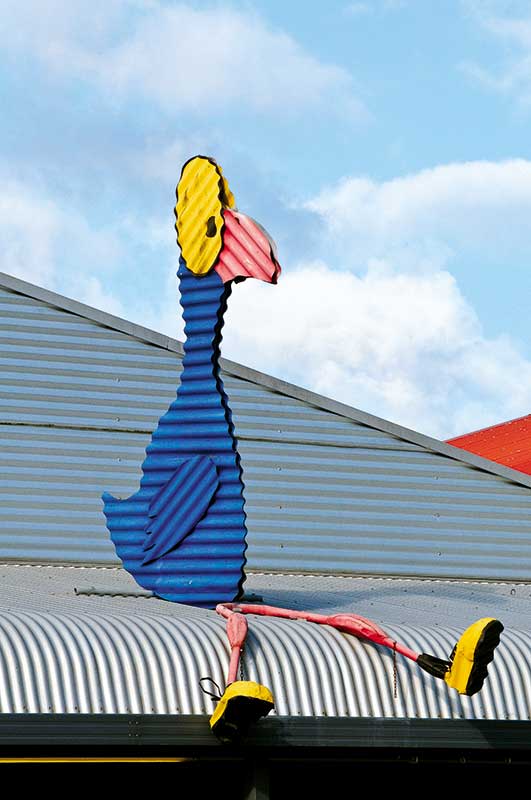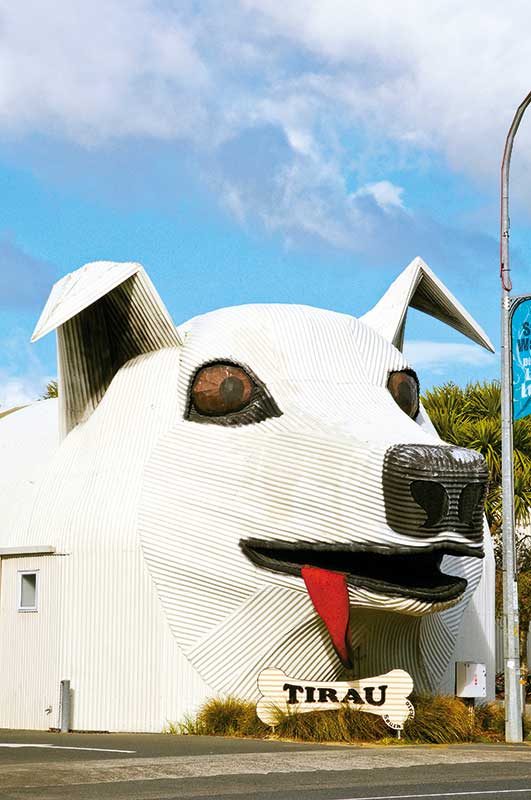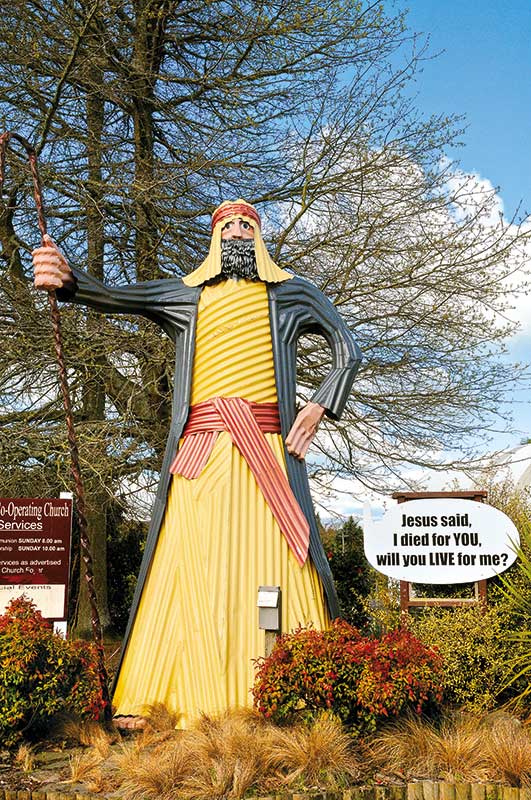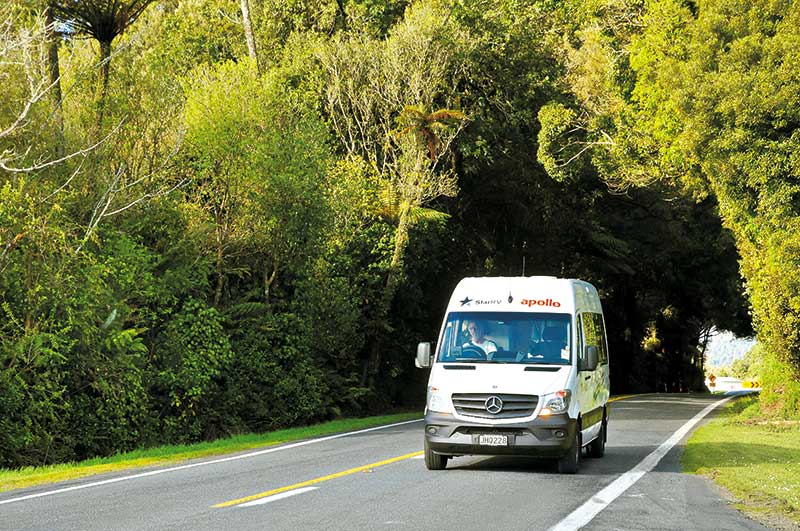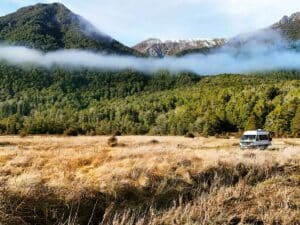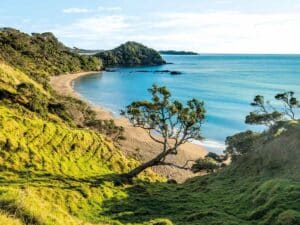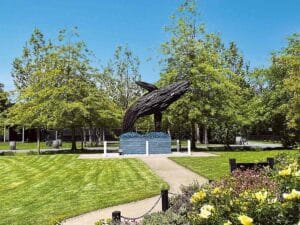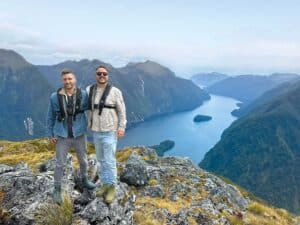Tirau is a little town in the central North Island with a drive-through main street. But, these days, first impressions are so quirky that one is forced to stop and check it out. And once stopped, and wandering around, there is plenty to see and do.
It’s the corrugated iron that makes the place quirky – it’s everywhere. There is a huge barn-sized corrugated iron sheep, next to an equally large corrugated iron dog, red tongue hanging out, with a four-metre tall Good Shepherd standing next to the dog, shepherd’s crook in hand, keeping an eye on motorists coming from the north.
Besides these large sculptural constructions, almost every shop and cafe has corrugated iron signage, as does the mechanic and the dairy. The pieces, whether signage or sculpture, are often humorous and artful and, except for the sheep, almost all of them are made by Steven Clothier. Steven is a Tirau man who used to be a mechanic but now works full-time making corrugated iron creations, not just for Tirau, but for people all over New Zealand.
Tirau didn’t become the corrugated iron capital of the world in a flash, it was something that evolved slowly. In the 1980s, like many other small country towns, Tirau was a victim of centralisation with local folk going to bigger and better Putaruru, Matamata and Cambridge for their shopping and other services. The bank, butchery, bakery, pharmacy, general store and post office all closed down. And there were many empty buildings in the main street.
Tirau is situated where Highway 1, between Auckland and Wellington, Highway 5 to Rotorua, and Highway 27 to Tauranga and Matamata, converge. There has always been a lot of through-traffic and, Henry Clothier, (father of Steven) was the first to see advantages inherent in very cheap real estate and passing traffic, so he opened a large antique and collectibles shop.
Before long, John and Nancy Drake decided, with all the tourist traffic passing, a wool and souvenir shop could work too, so they built a shop in a corrugated iron half-round barn. John suggested that they reorganise the exterior front of the shop so that it looked like a sheep, something unmissable, he thought.
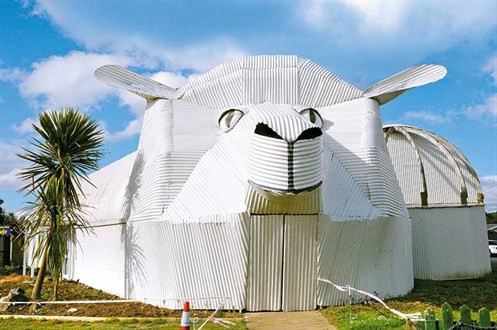
Then the South Waikato District Council was looking for a section in the main street on which to build a toilet, carpark and information centre and it offered to buy the empty section next to the sheep. John Drake had a better idea and he said the Council could have free use of the section if they built the toilets and information centre in the shape of a dog. And somehow, and I’m sure it involved a lot of fast talking, the Council went along with the idea.
The roofer who had built the sheep wouldn’t deal with a dog so Henry Clothier persuaded his handy son, Steven, to give it a go. The dog public toilets and i-centre opened in 1998.
The town was tickled with its dog and sheep and it seemed obvious that they needed a Good Shepherd to take care of them. The church next door to the dog was delighted to have a large-sized Jesus on its front lawn, and Steven was happy to create him.
And that is how Tirau’s turnaround began. Motorists stopped, more antique shops opened, more cafes opened and then, as it became an important stopping place on central North Island road journeys, unique specialty shops were established.
There are a dozen cafes within a few hundred metres. They have slightly different niches. The Italian Bakery has good food and coffee for people on the move. Ronnie’s serves traditional Kiwi fast-food. Loose Goose, at the other end of the spectrum, is close to fine dining and is open for long, slow, convivial evenings. Poppies (you can’t miss it as it has huge bright iron poppies on the roof) has efficient, friendly service and consistently good reviews on TripAdvisor.
Bugger Cafe could be a lot of fun, but I wasn’t attracted by the name. My favourite, and I haven’t checked them all out, is Heidi’s Swiss Cafe on the hill, a few metres down a side street. At Heidi’s, all the food is homemade, fresh and yummy, the coffee is ground for you and the décor is funky, with books and magazines adding a welcoming touch. The sweet treats are to die for.
I sniff around some of the speciality shops and in among merino, jade, silver jewellery and frock shops, and the Bendon Outlet Store, of course, I find some doozies.
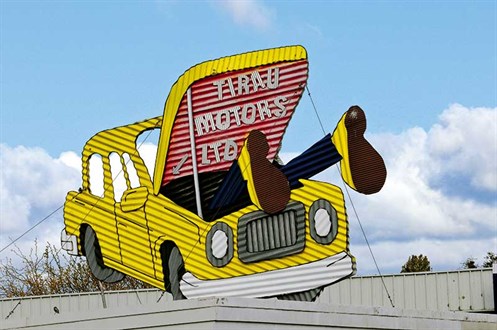
La More Sweets, not far from Heidi’s, has homemade fudge and chocolate, and lots of old-style lollies from the UK including Simpkins lollies, rock candy and sherbet. There are Kiwi old favourites such as aniseed balls, milk bottles, pineapple lumps, jaffas and spearmint leaves, plus a big range of Dutch liquorice.
On the same side of the road, not far away, I visit The Christmas Heirloom Company. I don’t enjoy the fuss of Christmas and am happy to say I don’t own a single Christmas decoration. But lots of people love Christmas and are keen to collect unique and beautiful Christmas treasures. This shop, which occupies a cute old cottage, has been selling Christmas decorations, all year, for the last 12 years and is still going strong.
Walk in and be dazzled. Weave between giant, evergreen, conical-shaped Christmas trees, each of which is decorated to the max. It’s over the top but tasteful, and useful to see decorations for more than just the tree. There are nativity scenes, Santas, sparkling fairy lights, garlands, angels, musical carousels playing carols and a huge variety of pretty hanging glass baubles. There is something for everyone, from cut crystal Santa trains worth lots, to surfing Santas worth a little. And kiwis (the bird) wearing Santa livery for tourists.
A few doors down the hill, I visit The Clock Shoppe of NZ where Robert and Michelle Russell sell only clocks. They stock over a 1000 different clocks including large grandfathers, medium-sized grandmothers, finely crafted cuckoo, traditional mantel, and clocks embedded in the middle of coffee tables. There are hundreds of different wall clocks, travel clocks, alarm clocks and a huge range of novelty clocks, for instance, a clock that looks like a cake mixer, one that is a combi van with surfboards on top and there is a bicycle clock with the dial set in the front wheel.
There is a clock to suit everyone and price to match. This shop has thrived for 15 years, helped by the fact that Russell is a certified watch and clock fixer. Every home needs an appropriate clock, even homes on wheels. Michelle says they often get motorhomers stopping to buy their perfect clock.
Speaking of the time, we have already spent a few hours in Tirau and this is the last day of our holiday. Sam is keen to get back to Auckland, return Apollo to base, and go to our non-mobile home. So we say goodbye to Tirau until next time, and hit the highway.
For the latest news, reviews and road trips, subscribe to Motorhomes Caravans & Destinations magazine here.

